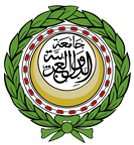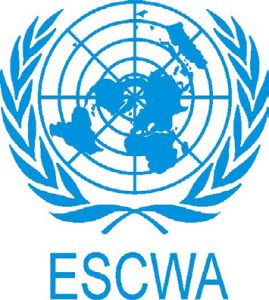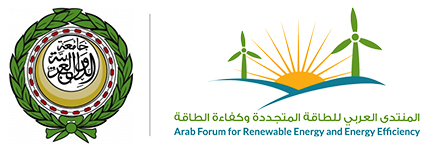League of Arab States, Arab Ministerial Council of Electricity
 The Arab Ministerial Council for Electricity (AMCE) was established based on league of Arab States council resolution num. 5394 in its 101 regular session held on 23rd of March 1994. AMCE is composed of Electricity Arab Ministers . It convenes regularly every two years, during which an Executive Bureau is elected that includes 8 Arab Countries. The bureau convenes at least once annually. AMCE has completely amended its statute, which was adopted by the Arab Leagues Council Resolution 7199 in its 133 regular session on 3 March 2010.
The Arab Ministerial Council for Electricity (AMCE) was established based on league of Arab States council resolution num. 5394 in its 101 regular session held on 23rd of March 1994. AMCE is composed of Electricity Arab Ministers . It convenes regularly every two years, during which an Executive Bureau is elected that includes 8 Arab Countries. The bureau convenes at least once annually. AMCE has completely amended its statute, which was adopted by the Arab Leagues Council Resolution 7199 in its 133 regular session on 3 March 2010.
The new statute resulted into the creation of two committees. The first is an expert committee for electricity mandated to follow-up on issues related to electricity and the Pan-Arab interconnection grids. The other committee is the renewable energy and energy efficiency committee mandated to follow-up on renewable energy issues and efficient production and utilization of energy.
AMCE aims to enhance and promote cooperation and coordinating efforts in the field of electricity production, transmission and distribution of in the Arab countries. AMCE coordinates Arab policies in the fields of electrical energy production while taking into consideration environmental concerns. Its objective is the promotion of Arab projects connecting electricity grids across the Arab states in preparation of launching a Pan Arab Market for Electricity. There is also the increasing interest in renewable energy and energy efficiency to diversify energy sources in the Arab world. The league of Arab states- Energy Department acts as the technical secretariat of AMCE.
Ministry of Electricity and Water-State of Kuwait

Electricity was introduced in Kuwait in 1934, through the “Electric Power Company”. Electricity production started with two generators of 30 KW capacity each. In 1950, with the increasing need for electricity, the company gradually converted to the tripartite system of alternating electricity. In 1951, with the urbanization wave, development, increasing demand for electricity, and upon the request of Sheikh Abdullah Al-Salem Al-Sabah, the Government of Kuwait bought the shares of the National Electricity Company and established the General Electricity Department. H.E Sheikh Jaber Al-Ali Al-Salem Al-Sabah was appointed as its Chairman. In 1952, the Electricity Department constructed the first electric power plant in the Shuwaikh area.
Kuwait now has 7 operating power plants, which are Shuwaikh, Shu’aybah North, Shuaiba South, Doha East, Doha West, Al Saiba, and South Al-Zour. Previously, Kuwait relied on artesian wells to satisfy its water needs. In 1905, the first well containing a relatively large stock of fresh water was discovered in Hawally.oli.
In early 1950s, particularly in 1951, KOC established a small seawater distillation unit in Mina al Ahmadi with a production capacity of 80,000 gallons of fresh water per day and its continuously enhanced to meet the demand. Later, a new method was developed in desalination of seawater based on evaporation and flux. Kuwait was the first country to adopt this method. Currently, the Ministry of Electricity and Water manages six water stations which are Shuwaikh plant, Shuaiba North, Shuaiba South, Doha East, Doha West, South Al-Zour.
The Regional Center for Renewable Energy and Energy Efficiency (RCREEE)

The Regional Center for Renewable Energy and Energy Efficiency (RCREEE) is an intergovernmental organization with diplomatic status that aims to enable and increase the adoption of renewable energy and energy efficiency practices in the Arab region. RCREEE teams with regional governments and global organizations to initiate and lead clean energy policy dialogues, strategies, technologies and capacity development in order to increase Arab states’ share of tomorrow’s energy.
Through its solid alliance with the League of Arab States, RCREEE is committed to tackle each country’s specific needs and objectives through collaborating with Arab policy makers, businesses, international organizations and academic communities in key work areas: capacity development and learning, policies and regulations, research and statistics, and technical assistance. The center is also involved in various local and regional projects and initiatives that are tailored to specific objectives.
Having today with 17 Arab countries among its members, RCREEE strives to lead renewable energy and energy efficiency initiatives and expertise in all Arab states based on five core strategic impact areas: facts and figures, policies, people, institutions, and finance.
RCREEE is financed through its member state contributions, government grants provided by Germany through the German Development Cooperation (GIZ) GmbH, Denmark through the Danish International Development Agency (DANIDA), and Egypt through the New and Renewable Energy Authority (NREA). RCREEE is also financed through selected fee-for-service contracts.
The Economic and Social Commission for Western Asia (ESCWA)
 The Economic and Social Commission for Western Asia (ESCWA), located in Beirut, was established on 9th of August 1973 as one of the five regional commissions created by United Nations (UN) to fulfill the socio-economic goals set out in the UN Charter. It comprises 18 Arab Member Countries (MCs); Bahrain, Egypt, Iraq, Jordan, Kuwait, Lebanon, Libya, Mauritania, Morocco, Oman, Palestine, Qatar, Saudi Arabia, Sudan, Syria, Tunisia, United Arab Emirates and Yemen.
The Economic and Social Commission for Western Asia (ESCWA), located in Beirut, was established on 9th of August 1973 as one of the five regional commissions created by United Nations (UN) to fulfill the socio-economic goals set out in the UN Charter. It comprises 18 Arab Member Countries (MCs); Bahrain, Egypt, Iraq, Jordan, Kuwait, Lebanon, Libya, Mauritania, Morocco, Oman, Palestine, Qatar, Saudi Arabia, Sudan, Syria, Tunisia, United Arab Emirates and Yemen.
ESCWA provides a framework for the formulation and harmonization of sectoral policies for Member Countries (MCs), a platform for congress and coordination, a home for expertise and knowledge, and an information observatory. ESCWA activities are coordinated with the divisions and main offices of the Headquarters of the United Nations, specialized agencies, and international and regional organizations, including the League of Arab States and its subsidiary bodies, and the Gulf Cooperation Council.
ESCWA Sustainable Development Policies Division (SDPD), is one of the seven substantive divisions, which seeks to achieve the integrated management of natural resources leading to improved food, water and energy security and enhanced resilience to climate change, and to mainstream the Sustainable Development Goals (SDGs) 2030 into regional and national policy processes, through relevant sections namely; Food and Environment Policies and Water Resources and Energy. The Energy Section’s activities within the context of its program of work 2018 – 2019, aim at achieving alignment of national plans with SDGs, drawing upon the nexus approach to water, energy and food as well as more engagement by MCs in regional and sub-regional processes. Furthermore, it supports agreements, strategies and standards related to water, energy, food and the environment, and strengthening of resilience of MCs and of vulnerable communities to climate change and natural disasters. The work focuses on SDG 7 on energy.
It is worth to mention that ESCWA ‘s energy programs are conceived and implemented through ongoing regular intergovernmental consultations with the MCs via ESCWA’s Committee on Energy (CoE), established in 1995 with the aim of setting up the regional priorities related to sustainable energy issues and aspects. ESCWA endorses the CoE recommendations as a guidance for its program of work in this respect. For further information, ESCWA’ Energy: www.unescwa.org/our-work/energy
Deutsche Gesellschaft für Internationale Zusammenarbeit (GIZ) GmbH
 As a provider of international cooperation services for sustainable development and international education work, we are dedicated to building a future worth living around the world. GIZ has over 50 years of experience in a wide variety of areas, including economic development and employment, energy and the environment, and peace and security. The diverse expertise of our federal enterprise is in demand around the globe, with the German Government, European Union institutions, the United Nations, the private sector and governments of other countries all benefiting from our services. We work with businesses, civil society actors and research institutions, fostering successful interaction between development policy and other policy fields and areas of activity.
As a provider of international cooperation services for sustainable development and international education work, we are dedicated to building a future worth living around the world. GIZ has over 50 years of experience in a wide variety of areas, including economic development and employment, energy and the environment, and peace and security. The diverse expertise of our federal enterprise is in demand around the globe, with the German Government, European Union institutions, the United Nations, the private sector and governments of other countries all benefiting from our services. We work with businesses, civil society actors and research institutions, fostering successful interaction between development policy and other policy fields and areas of activity.
Since we are a public-benefit federal enterprise, German and European values are central to our work. Together with our partners in national governments worldwide and cooperation partners from the private sector, academia and civil society, we work to deliver flexible and effective solutions that offer people better prospects and sustainably improve their living conditions.
The registered offices of GIZ are in Bonn and Eschborn. In 2016, our business volume was around EUR 2.4 billion. Of our 18,260 employees in some 120 countries, almost 70 per cent are national personnel working in the field.
GIZ collaborates with the Arab League (LAS) and its technical body, the Regional Center for Renewable Energy and Energy Efficiency (RCREEE) since 2013, within the framework of the International Climate Initiative (IKI) of the German Federal Ministry for Environment, Nature Protection and Nuclear Safety (BMU). In cooperation with RCREEE, GIZ supported LAS in developing the Arab Renewable Energy Framework (AREF) and the template for the National Renewable Energy Action Plans (NREAPs), which were officially adopted by the Arab Ministerial Council of Electricity in 2014. GIZ provides further support in implementing the Pan Arab Sustainable Energy Strategy as well as in drawing up national action plans and coordinating climate and energy policies. First national action plans have already been completed (Lebanon, Sudan), and more are currently under development (Jordan, Egypt, Iraq, and Djibouti).
